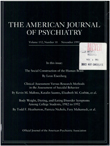Psychiatric complications of family reunion after four decades of separation
Abstract
OBJECTIVE: After four decades of separation due to civil war, many people who had migrated to Taiwan from mainland China had the unexpected opportunity to briefly visit their families in mainland China. A study was conducted to examine psychiatric complications associated with these family reunions following long involuntary separation. METHOD: Eighty subjects who made the journey were given semistructured interviews investigating their psychological experiences relating to the family reunion. The variables investigated were sociodemographic characteristics, the subject's previsit emotional condition, factors related to the family reunion experience, and stress encountered during the visit. RESULTS: The survey indicated that more than one-fifth of the subjects (22.5%) developed psychiatric complications, mainly depression, immediately after the visit. Determinants found to contribute significantly to the occurrence of emotional disorders were previous ways of expressing homesickness, family members seen during the reunion, family misfortunes that the subjects discovered, family conflict encountered at the reunion, and tactics for coping with such stressors. CONCLUSIONS: The study results suggest that family reunions after long-term separation can be trauma- repairing experiences for some but for others can lead to trauma reexperiencing and psychiatric complications requiring mental health intervention.
Access content
To read the fulltext, please use one of the options below to sign in or purchase access.- Personal login
- Institutional Login
- Sign in via OpenAthens
- Register for access
-
Please login/register if you wish to pair your device and check access availability.
Not a subscriber?
PsychiatryOnline subscription options offer access to the DSM-5 library, books, journals, CME, and patient resources. This all-in-one virtual library provides psychiatrists and mental health professionals with key resources for diagnosis, treatment, research, and professional development.
Need more help? PsychiatryOnline Customer Service may be reached by emailing [email protected] or by calling 800-368-5777 (in the U.S.) or 703-907-7322 (outside the U.S.).



